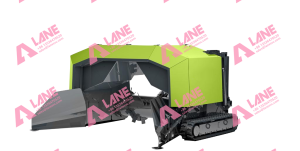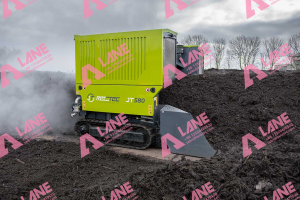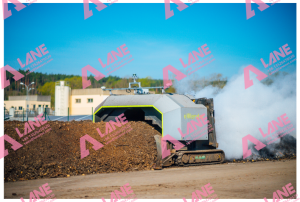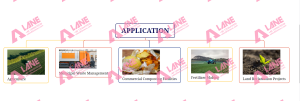What is a Driverless Compost Turner?

A Driverless Compost Turner is an advanced piece of agricultural machinery designed to automate the process of turning compost piles. Compost turning is a critical step in the decomposition of organic material, as it aerates the pile, ensuring that oxygen is evenly distributed throughout the material. This oxygen is essential for the microorganisms that break down the organic matter, transforming it into nutrient-rich compost.
The driverless aspect of this compost turner means that it operates autonomously, without the need for a human operator. Using a combination of GPS, sensors, and advanced algorithms, the machine navigates compost piles, performs turns, and monitors the composting process—all without human intervention.
Key Features:
- Autonomous Navigation: Equipped with GPS and sensors to navigate compost piles.
- Advanced Sensors: Monitor temperature, moisture, and oxygen levels in the compost.
- High-Performance Turning Mechanism: Ensures thorough mixing and aeration of the compost.
- Remote Monitoring: Allows operators to oversee the composting process from a distance.
The Driverless Compost Turner is designed to operate in various composting environments, from small farms to large industrial composting facilities. Here’s how it works:

- Initial Setup
Before the machine begins its work, the compost piles are laid out in rows or windrows. These piles consist of organic waste materials such as manure, crop residues, and other biodegradable matter. The compost turner is then programmed with the dimensions of the compost area, the desired turning frequency, and other operational parameters.
- Autonomous Operation
Once programmed, the Driverless Compost Turner uses GPS to navigate the compost piles. Its onboard sensors detect the boundaries of the windrows and ensure that the machine stays on course. As it moves along the pile, the turner’s high-performance blades or paddles lift and mix the compost, aerating it and redistributing moisture and heat.
- Monitoring Compost Conditions
The turner is equipped with sensors that monitor key composting parameters, such as temperature, moisture content, and oxygen levels. These sensors provide real-time data, which the machine uses to adjust its operation. For example, if the compost is too dry, the turner can reduce its speed or make additional passes to ensure even moisture distribution.
- Adjustments and Adaptation
The Driverless Compost Turner is designed to adapt to changing conditions. If it encounters obstacles or varying compost consistency, it can adjust its path or turning mechanism to maintain efficiency. This adaptability ensures that the composting process remains consistent, even in challenging environments.
- Remote Monitoring and Control
Operators can monitor the machine’s progress remotely using a smartphone or computer. The turner’s onboard system sends real-time data and alerts, allowing for adjustments to be made if necessary. This remote capability reduces the need for constant on-site supervision and allows for more efficient use of labor.
- Completion and Shutdown
Once the composting cycle is complete, the Driverless Compost Turner can be programmed to return to a designated resting area or shut down automatically. The finished compost is then ready for collection and use in agricultural or horticultural applications.
Advantages of the Driverless Compost Turner

Labor Savings
One of the most significant benefits of the Driverless Compost Turner is the reduction in labor costs. Traditional compost turning requires manual operation, which can be time-consuming and labor-intensive. By automating the process, this machine frees up labor for other tasks, increasing overall productivity.
Consistency and Efficiency
The autonomous nature of the turner ensures that compost piles are turned at consistent intervals, which is crucial for maintaining optimal composting conditions. This consistency leads to faster decomposition and a higher-quality end product.
Enhanced Monitoring
With built-in sensors that monitor temperature, moisture, and oxygen levels, the Driverless Compost Turner provides valuable data that can be used to optimize the composting process. This real-time monitoring ensures that the compost remains in the ideal range for microbial activity, resulting in faster and more efficient decomposition.
Environmental Benefits
By automating the composting process, the Driverless Compost Turner helps reduce greenhouse gas emissions associated with manual compost turning, such as those from diesel-powered machinery. Additionally, the machine’s precision in managing compost conditions reduces the risk of anaerobic decomposition, which can produce methane—a potent greenhouse gas.
Safety
The elimination of a human operator reduces the risk of accidents and injuries associated with manual compost turning. The machine’s autonomous operation also means that it can work in harsh or hazardous conditions, such as extreme heat or cold, without putting workers at risk.
Scalability
The Driverless Compost Turner is suitable for a wide range of composting operations, from small farms to large industrial facilities. Its ability to operate autonomously makes it an ideal solution for scaling up compost production without the need for additional labor.
Applications of the Driverless Compost Turner
The versatility of the Driverless Compost Turner makes it suitable for various composting applications:

- Agriculture:Farmers who generate large quantities of organic waste, such as manure or crop residues, can benefit from using a driverless compost turner. The machine’s ability to operate autonomously allows farmers to manage compost more efficiently, resulting in higher-quality organic fertilizer that can be used to enrich their soil.
- Municipal Waste Management:Municipalities that manage organic waste from households and businesses can use driverless compost turners to process this waste into compost. The machine’s efficiency and consistency make it ideal for large-scale composting operations, helping municipalities reduce landfill waste and produce valuable compost for public use.
- Commercial Composting Facilities:Commercial composting operations, which handle large volumes of organic waste, can greatly benefit from the automation provided by a driverless compost turner. The machine’s ability to operate continuously and without human intervention allows for 24/7 composting, increasing throughput and reducing costs.
- Horticulture:Horticultural businesses, such as nurseries and garden centers, often produce compost for use in their operations or for sale. A driverless compost turner can help these businesses manage their composting process more efficiently, producing high-quality compost that supports healthy plant growth.
- Land Reclamation Projects:In land reclamation projects where large quantities of organic matter need to be processed into compost, a driverless compost turner can be invaluable. The machine’s ability to operate in remote or difficult-to-access locations makes it ideal for these types of projects.
The Driverless Compost Turner represents a significant leap forward in organic waste management technology. By automating the composting process, it offers numerous benefits, including labor savings, enhanced consistency, and improved environmental outcomes. Whether you’re a farmer looking to improve soil health, a municipality managing organic waste, or a commercial composting operation seeking greater efficiency, the driverless compost turner is a powerful tool that can help you achieve your goals.
As the demand for sustainable waste management practices continues to grow, the Driverless Compost Turner is poised to play a critical role in the future of composting. With its combination of cutting-edge technology and practical applications, this machine is set to revolutionize the way we think about and manage organic waste.



